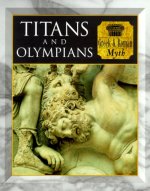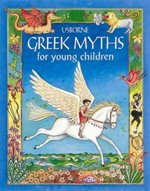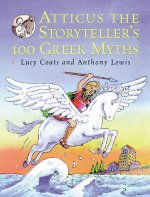Menu
Install the app
How to install the app on iOS
Follow along with the video below to see how to install our site as a web app on your home screen.
Note: This feature may not be available in some browsers.
You are using an out of date browser. It may not display this or other websites correctly.
You should upgrade or use an alternative browser.
You should upgrade or use an alternative browser.
Greek Mythology Community
What are the best Greek mythology books for teens?
- Thread starter nadellii
- Start date
1 - 6 of 6 Posts
J
John Stefan
Guest
Yes I do. Below are 3 good Greek Mythology Books to recommend for teenagers.
1 - Atticus The Storyteller 100 Greek Myths
2 - Usborne Greek Myths for Young Children
3 - Titans and Olympians Greek and Roman Mythology Myth and Mankind
I hope this helps as they are all very good books in my opinion so any or all of them will do.
kind regards John Stefan
1 - Atticus The Storyteller 100 Greek Myths
2 - Usborne Greek Myths for Young Children
3 - Titans and Olympians Greek and Roman Mythology Myth and Mankind
I hope this helps as they are all very good books in my opinion so any or all of them will do.
kind regards John Stefan
kosta_karapinotis
Active member
I love the Percy Jackson series! It's inspired by Greek mythology, not actual Greek mythology
J
John Stefan
Guest
knicks_fan87
Active member
I used to have Greek Myths for Young Children! You're bringing back so many memoriesBelow are the pictures of the 3 books that I recommended
kind regards John Stefan
k_tsoukalas
Administrator
I read the Edith Hamilton one when I was in middle school. I think I was a bit too young, but high school age might be about right for that one.

 en.wikipedia.org
en.wikipedia.org

Mythology (book) - Wikipedia
1 - 6 of 6 Posts
JOIN THE DISCUSSION AND READ OTHER GREEK INFO:
Mythological Roots of the Olympic Games
- dimi_pat
- Greek Mythology Forum
- Replies: 1
I've recently found myself deeply fascinated with how ancient myths and legends have influenced modern traditions and events, particularly those with a global following. Among these, the Olympic Games stand out as a prime example of ancient traditions influencing contemporary world culture. I'm eager to learn more about the mythological roots of the Olympic Games and thought this would be the perfect community to turn to for insights.
From what I understand, the origins of the Olympics are deeply intertwined with Greek mythology. The games were held in Olympia, a sanctuary site for Greek gods, and featured various competitions and rituals dedicated to Zeus, the sky and thunder god in ancient Greek religion. However, my knowledge of how these mythological aspects directly influenced the establishment and evolution of the Olympic Games feels quite superficial.
From what I understand, the origins of the Olympics are deeply intertwined with Greek mythology. The games were held in Olympia, a sanctuary site for Greek gods, and featured various competitions and rituals dedicated to Zeus, the sky and thunder god in ancient Greek religion. However, my knowledge of how these mythological aspects directly influenced the establishment and evolution of the Olympic Games feels quite superficial.
Afterlife Beliefs in Greek Mythology?
- toniiv
- Greek Mythology Forum
- Replies: 0
What did Ancient Greeks believe about the afterlife? I've heard a few different stories... I'm particularly drawn to Ancient Greece's take on life after death.
Was there a uniform belief system, or did it vary significantly among different cities or periods? How did their beliefs influence their daily life and practices? I'm also curious about the role of mythological figures like Hades and the concept of Elysium.
If anyone has any expertise, recommended readings, or can point me to resources where I might be able to gather detailed insights into these spiritual aspects of Ancient Greek culture, I would greatly appreciate it.
Was there a uniform belief system, or did it vary significantly among different cities or periods? How did their beliefs influence their daily life and practices? I'm also curious about the role of mythological figures like Hades and the concept of Elysium.
If anyone has any expertise, recommended readings, or can point me to resources where I might be able to gather detailed insights into these spiritual aspects of Ancient Greek culture, I would greatly appreciate it.
12 Olympian Gods and Goddesses
- ssherie_
- Greek Mythology Forum
- Replies: 1
I love mythology and I thought I'd make list of the 12 Olympian Gods and Goddesses. This is my best guess. Do you know that I have seen different versions of this? What do you think?

- Zeus: The king of the gods, ruler of the sky and thunder, and the god of law, order, and justice.
- Hera: The queen of the gods, Zeus's wife and sister, and the goddess of marriage and childbirth.
- Poseidon: The god of the sea, earthquakes, and horses, often depicted with a trident.
- Demeter: The goddess of agriculture, fertility, and the harvest, responsible for the cycle of life and death in crops.
- Athena: The goddess of wisdom, warfare, strategy, and crafts, often associated with strategic warfare and civilization.
- Apollo: The god of music, poetry, prophecy, healing, and archery, known for his wisdom and beauty.
- Artemis: The goddess of the hunt, wilderness, childbirth, and virginity, often depicted with a bow and arrows.
- Ares: The god of war, violence, and bloodshed, embodying the brutal aspects of conflict.
- Aphrodite: The goddess of love, beauty, pleasure, and procreation, born from the sea foam and known for her irresistible charm.
- Hephaestus: The god of fire, blacksmiths, craftsmen, and volcanoes, renowned for his skill in metalworking.
- Hermes: The messenger of the gods, associated with travel, commerce, communication, and trickery.
- Dionysus: The god of wine, fertility, ecstasy, and theatre, representing the joyous aspects of life and celebration.

Aphrodite - Greek Goddess of Love
- dimi_pat
- Greek Mythology Forum
- Replies: 1
Ahead of Valentine's Day, I thought I'd share some things that I thought were interesting about Aphrodite, the Greek Goddess of love:
1. Aphrodite Was Born from Sea Foam.
In Greek mythology, it's said that Aphrodite was born from the sea foam that formed when Cronus cut off Uranus's genitals and threw them into the ocean. As the spirit of desire and physical attraction, Aphrodite's birth story reflects the power of nature and the irresistible force of passion.
2. She Was Married to Hephaestus.
Despite her reputation as the goddess of love and beauty, Aphrodite had a less-than-romantic marriage with Hephaestus, the god of blacksmiths and volcanoes. Hephaestus was unattractive and had a limp, and Aphrodite had several affairs with other gods and mortals. To me, this seem like an unlikely match.
3. She Possessed a Magic Girdle.
To make herself even more desirable and seductive, Aphrodite had a magic girdle that could make anyone fall in love with her. It's said that she used this girdle to win the hearts of both gods and mortals and cause conflicts and jealousy among them.
4. She Had Children with Several Gods and Mortals.
Aphrodite was famous for her many love affairs, and she had children with several gods and mortals. Her most famous son was Eros, the god of love and passion, who was sometimes depicted as her lover as well.
5. She Was Worshiped throughout Ancient Greece.
As the goddess of love and beauty, Aphrodite was a popular deity throughout ancient Greece and was worshiped in many cities and temples. She was also associated with fertility, sexuality, and even war, as seen in her role as a protector of soldiers and sailor.
6. Her Symbols Included Doves, Roses, and Mirrors.
Like most deities, Aphrodite had several symbols that represented her qualities and powers. Her most common symbols were doves, roses, and mirrors, which reflected her beauty, love, and vanity.
1. Aphrodite Was Born from Sea Foam.
In Greek mythology, it's said that Aphrodite was born from the sea foam that formed when Cronus cut off Uranus's genitals and threw them into the ocean. As the spirit of desire and physical attraction, Aphrodite's birth story reflects the power of nature and the irresistible force of passion.
2. She Was Married to Hephaestus.
Despite her reputation as the goddess of love and beauty, Aphrodite had a less-than-romantic marriage with Hephaestus, the god of blacksmiths and volcanoes. Hephaestus was unattractive and had a limp, and Aphrodite had several affairs with other gods and mortals. To me, this seem like an unlikely match.
3. She Possessed a Magic Girdle.
To make herself even more desirable and seductive, Aphrodite had a magic girdle that could make anyone fall in love with her. It's said that she used this girdle to win the hearts of both gods and mortals and cause conflicts and jealousy among them.
4. She Had Children with Several Gods and Mortals.
Aphrodite was famous for her many love affairs, and she had children with several gods and mortals. Her most famous son was Eros, the god of love and passion, who was sometimes depicted as her lover as well.
5. She Was Worshiped throughout Ancient Greece.
As the goddess of love and beauty, Aphrodite was a popular deity throughout ancient Greece and was worshiped in many cities and temples. She was also associated with fertility, sexuality, and even war, as seen in her role as a protector of soldiers and sailor.
6. Her Symbols Included Doves, Roses, and Mirrors.
Like most deities, Aphrodite had several symbols that represented her qualities and powers. Her most common symbols were doves, roses, and mirrors, which reflected her beauty, love, and vanity.
Are there influences of Greek mythology in our modern culture?
- ssherie_
- Greek Mythology Forum
- Replies: 0
I've been deeply fascinated by Greek mythology for as long as I can remember—its epic tales, deities, and heroes that have influenced countless aspects of Western culture. Recently, I've started to ponder more deeply about its presence and influence in our contemporary life and culture. From literature and movies to expressions and brands, it seems Greek mythology has woven itself into the very fabric of our daily experiences.
I'm curious to hear your thoughts and observations on this topic. Have you noticed any interesting or surprising ways Greek mythology manifests in today's society? Perhaps in ways we might not even immediately recognize due to how integrated they are?
I'm curious to hear your thoughts and observations on this topic. Have you noticed any interesting or surprising ways Greek mythology manifests in today's society? Perhaps in ways we might not even immediately recognize due to how integrated they are?
Share and discuss Greek mythology!
WorldwideGreeks.com is a free online forum community where people can discuss Greek food, travel, traditions, history and mythology.
Join Worldwide Greeks here!
Join Worldwide Greeks here!
JOIN COMMUNITY FOR FREE
LOGIN TO YOUR ACCOUNT





